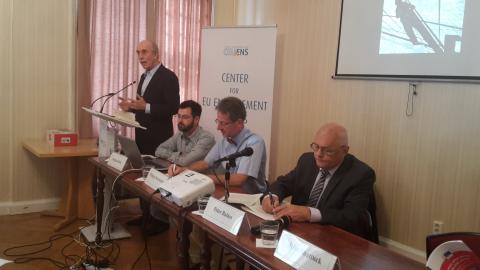Event report - "25 years after the fall of the Iron Curtain. The state of integration of East and West in the European Union - Official launch of the European Commission publication"

On September 24th, 2015, the Center for EU Enlargement Studies (CENS) organized the official launch of the European Commission publication entitled 25 years after the fall of the Iron Curtain. The state of integration of East and West in the European Union, at the Central European University (CEU) in Budapest. The initiative to write such a review paper originated with the European Commission and its main goal was to offer a critical overview of the political, economic, social and cultural transformations that took place in the European Union’s New Member States of East Central Europe. Professor Péter Balázs, Director of CENS, coordinated a team of researchers from CENS and CEU, that included professors, researchers and students. The result of this joint effort is a scientifically precise yet concise material, equally interesting and accessible for policy makers, scholars or the general public.
During the official launch, the President and Rector of the Central European University, John Shattuck stated the importance of such a publication that reflects increasing cooperation between the European Commission and the CEU, and briefly discussed 25 years of political transformations in East Central Europe. Professor Péter Balázs explained the necessity and rationale of the review paper, and offered an insightful account of the two decades and a half of political and economic changes in the EU’s New Member States. Professor András Bozóki, from CEU presented his view on how democratic transition and consolidation materialized in this region, recognizing the partial success of political reforms while also identifying their shortcomings, such as the rise of populism. Dr. Bogdan Radu, researcher at CENS, offered an overview of cultural changes in East Central Europe after 1989, and concluded that levels of intolerance towards different categories of minorities and levels of political apathy are still too high. Finally, Mr. Philippe Keraudern, Head of Unit at the General Directorate for Research and Innovation at the European Commission, brought into de discussion the European Union’s view on the political and economic changes taking place in its East and Central European Member States since 1989, and emphasized the importance of managing adequately the diversity of political systems, institutions and also mentalities co-existing within the EU.
